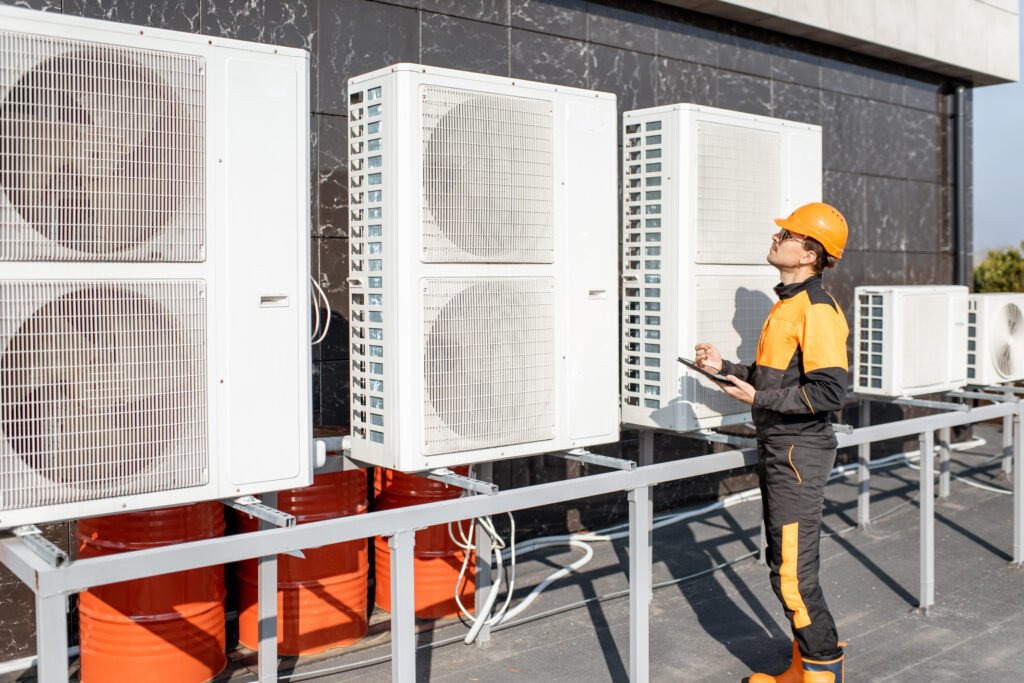As energy costs continue to rise and there is a heightened emphasis on reducing emissions, property owners are increasingly seeking efficient alternatives to traditional heating systems. One such alternative, gaining popularity in both residential and commercial applications, is the heat pump. Heat pumps offer several advantages, such as energy efficiency, versatility, and lower environmental impact when compared to traditional heating systems. We will delve into the advantages and key considerations of utilizing heat pumps for your space’s heating needs and how our professionals can help you make an informed decision with our expertise in both heat pump and traditional heating installation and repair.
Selecting the Right Heat Pump for Your Property
There are multiple types of heat pumps available in the market, each with its specific advantages and application scenarios. To determine the best option for your property, it’s essential to become familiar with the main heat pump varieties:
- Air-source heat pumps: These units extract heat from the outdoor air and transfer it into your property. They are widely used in moderate climate zones and offer an energy-efficient heating and cooling solution.
- Ground-source heat pumps: Also known as geothermal heat pumps, these systems harness heat from the ground using a series of buried pipes. While they generally have higher installation costs, ground-source heat pumps offer greater efficiency and resilience to temperature fluctuations, making them suitable for regions with harsh winters.
- Ductless mini-split heat pumps: Designed for properties with limited space or without existing ductwork, these compact systems consist of an outdoor unit and one or multiple indoor units. Ductless mini-split heat pumps are ideal for providing targeted heating and cooling solutions in specific rooms or zones to enhance comfort and efficiency
Our professionals can help you assess and select the most appropriate heat pump system for your property, taking into consideration factors such as climate, building insulation, available space, and budget constraints.
Optimizing Heat Pump Efficiency with Proper Installation and Maintenance
To ensure that your heat pump operates at peak efficiency, proper installation and regular maintenance are crucial. Our technicians not only have the expertise to size and select the ideal system for your needs but are also well-versed in following the best practices for heat pump installation. It involves a careful evaluation of your property’s insulation and the optimal placement of indoor and outdoor units to maximize heat transfer and minimize heat loss.
Further, scheduling periodic maintenance for your heat pump system is essential in maintaining its performance, prolonging its lifespan, and protecting your investment. During a maintenance visit, our professionals will perform tasks such as:
- Inspecting and cleaning filters, coils, and blower components to ensure efficient airflow and heat exchange.
- Checking refrigerant levels and pressure to optimize performance and identify potential refrigerant leaks.
- Examining and tightening electrical connections and inspecting wires for signs of wear and tear.
- Verifying the correct functioning and calibration of thermostats and other system controls.
Comparing Heat Pumps to Traditional Heating Systems
To provide a comprehensive understanding of the advantages and considerations of heat pumps, it’s necessary to compare them with traditional heating systems, such as furnaces and boilers. The key differences include:
- Energy efficiency: Heat pumps typically offer higher energy efficiency—by transferring heat rather than producing it—compared to furnaces and boilers. This results in reduced energy consumption and cost savings on utility bills.
- Combined heating and cooling: Unlike traditional heating systems, heat pumps can provide cooling during the summer months, thanks to their reversible functionality. This dual-purpose capability eliminates the need for separate heating and cooling systems.
- Environmental impact: Heat pumps have a lower carbon footprint than traditional heating systems, as they utilize renewable energy sources and emit fewer greenhouse gases. By choosing a heat pump, you are promoting a cleaner and greener environment.
- Installation requirements: While heat pumps generally have lower operating costs, they may have higher upfront installation expenses, particularly for ground-source systems, due to the complex nature of geothermal installations.
Understanding the Limitations of Heat Pumps
While heat pumps offer many advantages, they may not be the perfect solution for every situation. Some potential limitations of heat pumps include:
- Climate sensitivity: Heat pumps are most effective in moderate climates and may require supplemental heating sources in extremely cold regions, as their performance declines with decreasing outdoor temperatures. In such cases, a traditional heating system may be more suitable.
- Higher upfront costs: Depending on the type of heat pump and the complexity of the installation, the initial investment may be higher than that of traditional heating systems. However, lower operating costs and long-term energy savings may offset these costs over time.
Conclusion
Heat pumps provide a versatile and energy-efficient alternative to traditional heating systems for residential and commercial properties. By understanding the advantages and limitations of heat pumps, as well as the different types available, you can make an informed decision that meets your specific requirements and promotes a comfortable and environmentally friendly indoor environment. Our professionals at Agape Air Heating & Cooling are here to guide and support you in choosing, installing, and maintaining the most suitable heating solution for your property. Contact our HVAC contractor in Gilbert, AZ to discuss your needs and explore the benefits of heat pumps as a viable option for your heating requirements.


